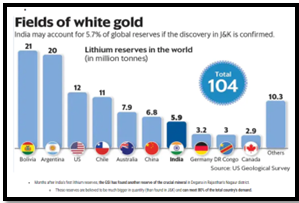About Lithium _:
- Primary Component of Lithium-ion Batteries: Lithium is a vital element used in the production of lithium-ion batteries, which power various electronic devices, electric vehicles (EVs), and battery energy storage systems (BESS).
- Energy Transition: Lithium plays a central role in the global transition towards renewable energy and sustainable transportation. Its use in lithium-ion batteries facilitates the adoption of clean energy technologies, reducing reliance on fossil fuels and mitigating environmental impact.
- Key to Electric Vehicles: Lithium-ion batteries are the primary energy source for electric vehicles, enabling them to operate efficiently and achieve extended ranges. The growth of the electric vehicle market is heavily dependent on the availability and affordability of lithium resources.
- Energy Storage Solutions: Lithium-ion batteries are also utilized in battery energy storage systems (BESS) for grid stabilization, renewable energy integration, and peak demand management. Lithium’s high energy density and rechargeability make it ideal for storing electricity generated from solar, wind, and other renewable sources.
- Consumer Electronics: Lithium-ion batteries power a wide range of consumer electronics, including smartphones, laptops, tablets, and wearable devices. Their lightweight, high energy density, and long cycle life make them preferred energy storage solutions for portable electronics.
- Medical and Industrial Applications: Lithium compounds are used in various medical treatments, such as bipolar disorder and depression. Additionally, lithium is employed in industrial applications, including lubricants, ceramics, glass, and aluminum production.
- Global Demand and Supply Chain: The increasing demand for lithium, driven by the rapid growth of electric vehicles and renewable energy technologies, has led to a global focus on lithium exploration, mining, and production. Countries with significant lithium reserves, such as Australia, Chile, and Argentina, play crucial roles in the global lithium supply chain.
|
source-US agency




